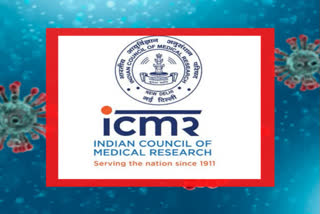New Delhi:With the initial tests conducted and doubling rate of COVID-19 cases slowed nationally, the question that lingers is what's next? In an attempt to decide the future course of action against the pandemic, the ICMR has given a detailed plan to all the states to measure coronavirus exposure in the general population as well as in high-risk populations.
And that is why it has asked states to conduct sero-survey to measure coronavirus exposure in the population using IgG ELISA test.
"This sero-survey will guide appropriate public health intervention," says the ICMR, while adding that "the numbers and frequency indifferent groups to be tested has been entrusted to states depending upon the requirement and situation in that particular area."
The sero-survey would be conducted using an IgG ELISA kit, the same kit scientists at ICMR-National Institute of Virology in Pune have developed and validated as indigenous test for antibody detection for SARS-CoV-2.
The test has undergone intense validation in three stages and has been found to have high sensitivity and specificity. To fast-track production and increase availability of the IgG ELISA test, ICMR has transferred this technology to many pharma companies like Zydus Cadila, J Mitra & Company, Meril Diagnostics, Voxtur Bio, Trivitron Healthcare, Karwah Enterprises, Avecon Healthcare, among others.
"The technology has been transferred to various entities without exclusivity clause and therefore can be further shared with others as per demand and capability," said India's foremost medical research body.
Explaining the relevance of the test and its significance for India, the ICMR said: "The test is useful only when performed in the acute stage of infection (< 7 days). For several viral infections, antibody tests are useful for disease detection after 5-7 days of illness. Understanding related to antibody tests for COVID-19 is evolving and several tests are being developed globally."
What benefit will these tests result in? They will help to understand the proportion of the population exposed to SARS-CoV-2 infection, including asymptomatic individuals. Depending upon the level of sero-prevalence of infection, the Centre can plan appropriate public health interventions and implement for prevention and control of the disease.
Also read:COVID-19: With 11,264 patients cured in last 24 hrs, recovery rate jumps to 47.40 pc
